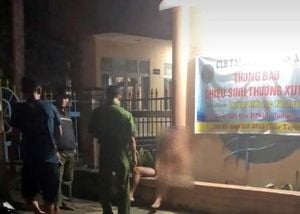On the streets of Dakar’s Yoff neighborhood, the melodious prayers and rhythmic chants of thousands of Sufi Muslims filled the air as they commemorated the 145th anniversary of the first public appearance of their founder, Seydina Limamou Laye, on January 31, 1884. The gathering, known as “L’Appel” or “The Call,” is not merely about remembering a historical event; it reflects the enduring legacy of Laye’s teachings on equality and divine connection.
Worshippers clad in pristine white robes—symbolizing purity and equality before God—flooded the avenues leading to Yoff’s beachside mosque. This annual celebration attracted many from across Senegal, showcasing the Layene brotherhood’s unique identity, smaller compared to other Sufi orders such as the Mouride and Tijan, yet marked by distinct beliefs including the controversial claim of Laye as the reincarnation of the Prophet Muhammad.
Dr. Cheikh Babou, a history professor at the University of Pennsylvania who specializes in Sufism, noted, “I’ve never seen any Sufi order where the idea of reincarnation is so central as it is with the Layene. It’s not like anything else in Senegal or elsewhere in the Muslim world.” This claim differentiates the Layene brotherhood from more widely recognized sects, invigorated by the motto of individual and collective awakening.
During the celebration, many pilgrims made their way to the sacred grotto where Seydina Limamou Laye is believed to have received divine inspiration. This location symbolizes both the beginning of his teachings and the connection between the Layene community and their revered prophet. For followers, Laye’s message was revolutionary; it proclaimed the return of the Prophet Muhammad as embodied by Laye, who emphasized justice within the sphere of societal imbalance, particularly concerning the historical plight of Black individuals and the injustices of slavery.
Moussa Lahi, one of the attendees, passionately remarked, “It is pride for both Black and white people because Seydina Limamou Laye is not the prophet of Black people; he is a universal prophet. So, there are white people, Black people, yellow people—everyone. He brought equality among the races.” This assertion captures the inclusive spirit of the Layene brotherhood, challenging traditional racial paradigms.
The atmosphere of “L’Appel” was charged with vibrant energy, as the community came together to reflect on their shared identity and the principles of love, respect, and unity perpetuated by Seydina Limamou Laye. Over the years, the Layene brotherhood has become more visible within the religious fabric of Senegal, demonstrating their unique practices and beliefs against the backdrop of the country’s diverse Sufi environment.
The resonance of Seydina Limamou Laye's vision is evident even today, where his teachings urge followers to embrace diversity and promote harmony among different races. The annual celebration emphasizes this principle, creating not only religious significance but also serving as a unifying event for community members and visitors alike.
With each passing year, “L’Appel” serves as more than just a memorial; it is also a call to action for followers to commit to Laye’s teachings of compassion, justice, and social equity. It is revitalize by their shared belief system, which continues to inspire and guide them as they navigate the challenges of modernity.
The celebration serves as both reflection and action, encouraging followers not only to honor their past but also to reinforce their commitment to racial integrity and equality. The Layene brotherhood, with its unique message of hope and unity, delivers powerful lessons not just for Senegal but for the broader global community grappling with issues of inequality.



